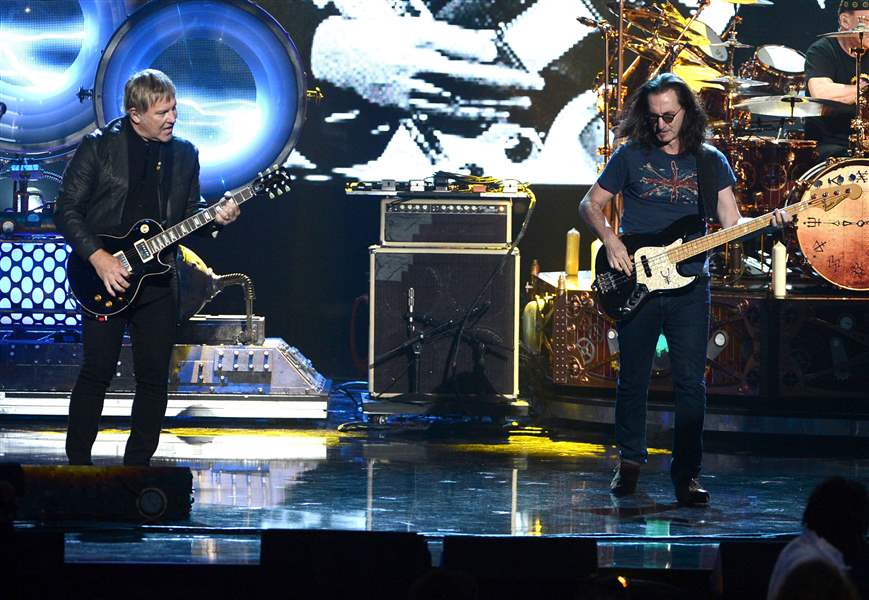
CULTURE SHOCK
A quiet ending for Rush
1/25/2018
Alex Lifeson and Geddy Lee of Rush perform on stage at the 28th Annual Rock and Roll Hall of Fame Induction Ceremony at Nokia Theatre L.A. Live on April 18, 2013 in Los Angeles.
Getty Images
Late into a lengthy phone interview with Alex Lifeson in late 2008 for The Blade, I asked the legendary Rush guitarist how he would script the ending for his band.
It was a question that had him contemplate something that seemed so far off, considering at that time Rush was just beginning to enjoy a major cultural re-evaluation. The Canadian power trio, long dismissed as prog-rockers for nerds, was becoming cool — five years later, in fact, Rush would be inducted into the Rock and Roll Hall of Fame. So naturally the query’s premise caught him by surprise.

Alex Lifeson and Geddy Lee of Rush perform on stage at the 28th Annual Rock and Roll Hall of Fame Induction Ceremony at Nokia Theatre L.A. Live on April 18, 2013 in Los Angeles.
”That’s a tough question,” Lifeson replied. “I don’t know. I was going to say that we go out on this incredible tour where we were just at the top of our game and we moved on and that was it. But at the same time, and I think maybe it’s because I am Canadian, I think I’d like us to rather just go quietly out. Just kind of fade away quietly and not cause a big deal.”
In fact, Rush did both of those things.
In celebration of its 40th anniversary in 2015, Rush launched a successful and acclaimed summer tour that featured a career-spanning set list that started at the end (”The Anarchist”) and wound its way to the band’s beginning (an excerpt of “Garden Road”) as the finale.
So seven years after the interview, Rush had its “incredible tour where we were just at the top of our game” farewell scenario.
And that leads us to the second and far more difficult to process part: The “I’d like us to rather just go quietly out ... and not cause a big deal” exit.
Earlier this week Lifeson did just that as he causally mentioned in an interview that Rush is essentially no more.

”It’s been a little over two years since Rush last toured. We have no plans to tour or record any more. We’re basically done,” Lifeson told the Globe and Mail. “After 41 years, we felt it was enough.”
A longtime Rush fan, I was stunned and saddened by the announcement. But this isn’t the first time.
Nearly 20 years ago, after drummer Neil Peart suffered devastating tragedies back-to-back with the death of his teenager daughter in a car accident in 1997 and the death of his wife from cancer less than a year later, Rush went on hiatus. Fans weren’t certain whether Rush would get back together, and neither was Lifeson, as he told me.
“That was a very, very difficult period ... as far as we were concerned, the band had very little chance of surviving; I mean, Neil was barely surviving.”
But Peart did survive and so did Rush, with the trio of longtime bandmates and friends making a triumphant return in 2002 with the album Vapor Trails, which debuted at No. 6 on Billboard.
In the years that followed, Rush recorded three more studio discs, launched several world tours, each chronicled with a concert album and video, and released various compilations as well as remastered editions of the band’s seminal and classic works.
Perhaps, then, Rush fans, including and especially myself, should consider these 16-plus years of the band an unexpected and well-enjoyed gift, even if some of us weren’t quite ready to give it up.
It is difficult, after all, watching something that’s been a part of your life for so long just ... end. But that’s the irony of youth: As we grow older, so does our past.
During my Lifeson interview from nearly a decade ago, I asked him if he had ever considered what would be Rush’s legacy. He said he hadn’t.
“We’ve always tried to stay in the present as much as we could and make sure we did the best job in whatever it is we’re doing,” Lifeson said. “I’m very proud of what we’ve accomplished and what we’ve done. The fact that we’re still together after so many years is an amazing achievement, and the fact that we’re playing the best that we’ve ever played is also quite incredible to me.
“When it’s all said and done,” he added, “I think I’ll feel very content and very happy with what we’ve left behind in the world of music.”
Contact Kirk Baird at kbaird@theblade.com or 419-724-6734.